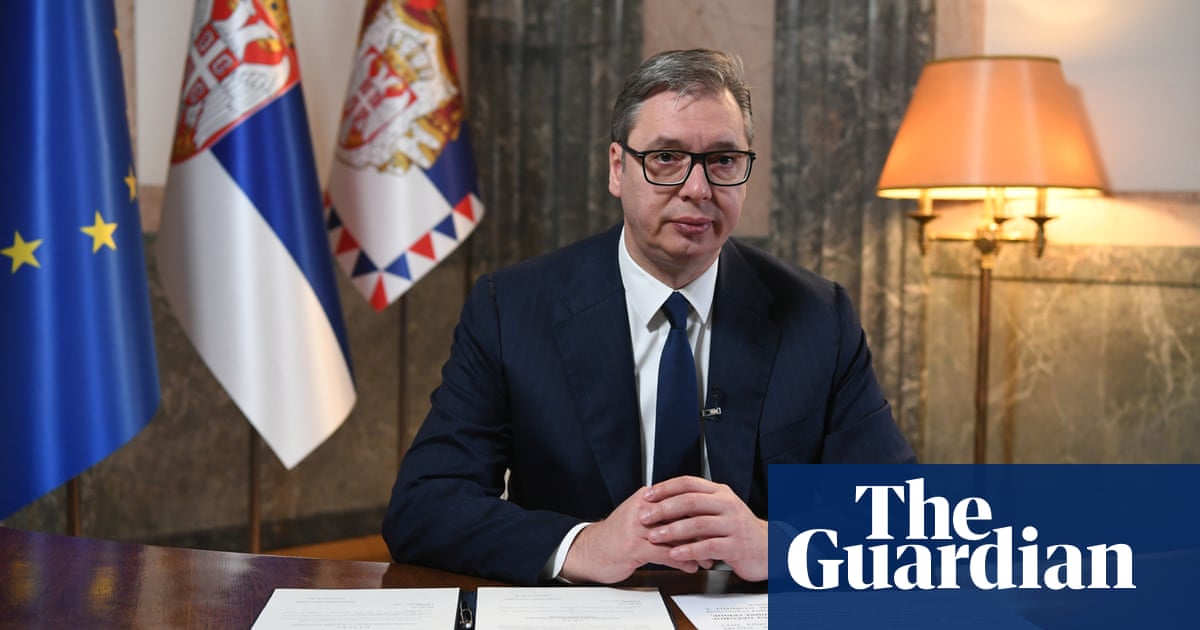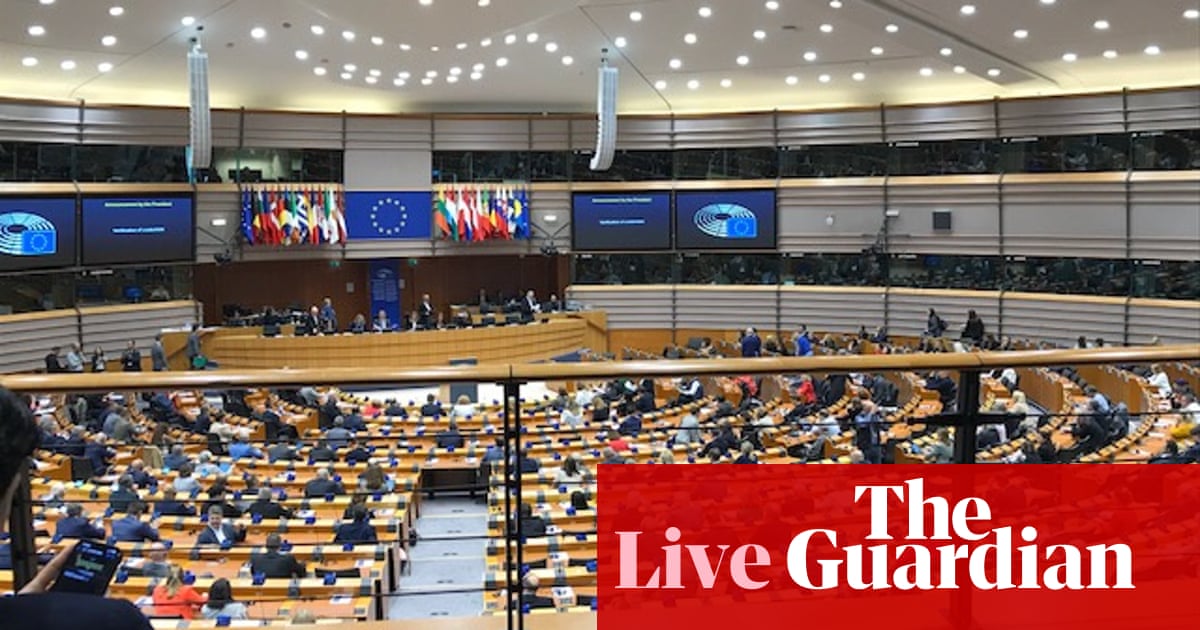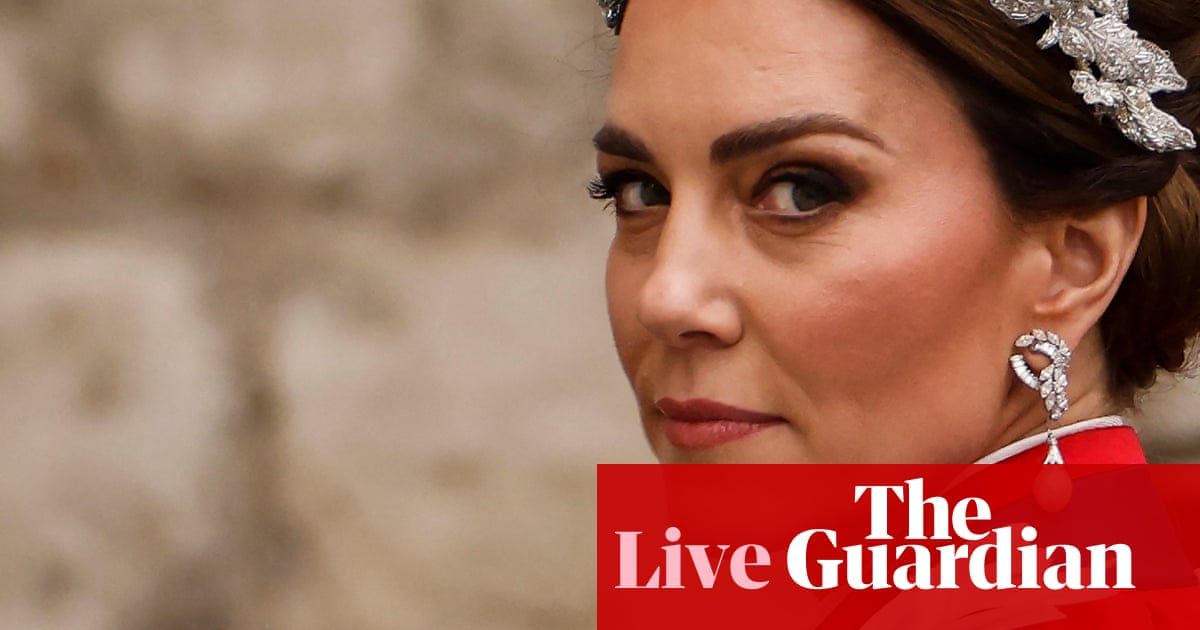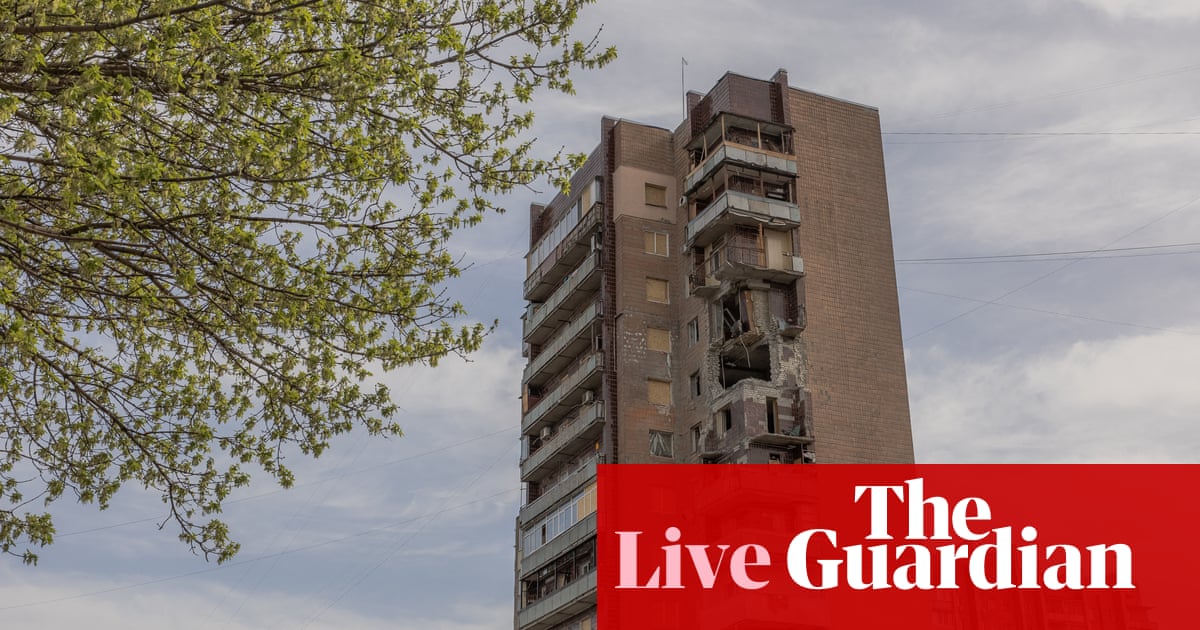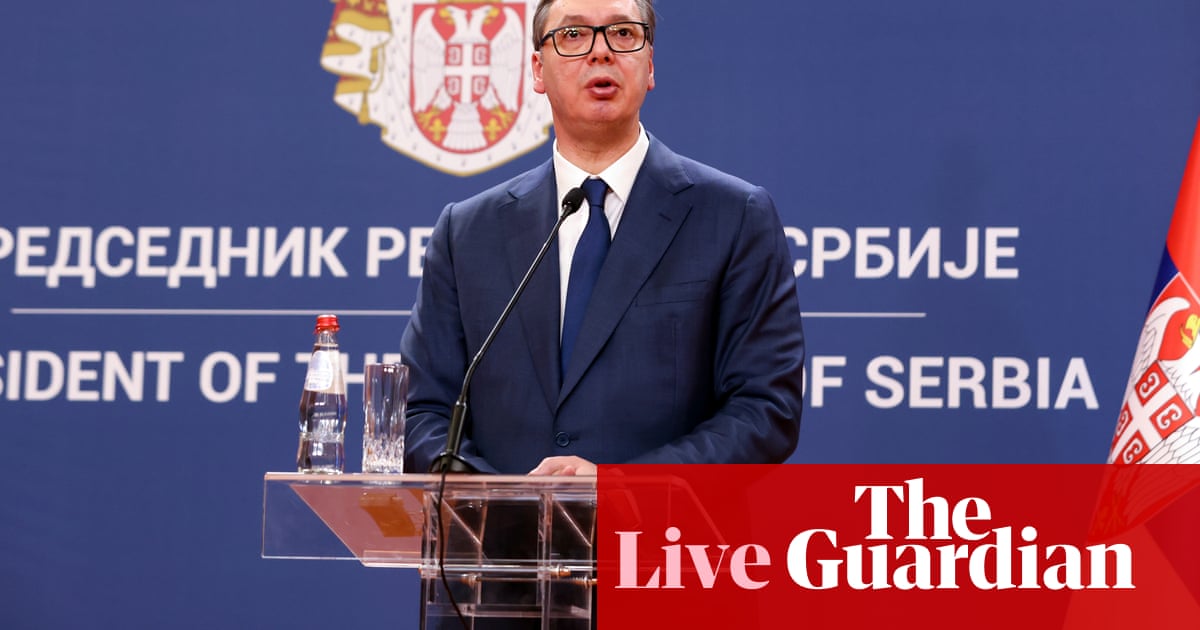
Vučić sets election for 17 December
Serbia’s president, Aleksandar Vučić, dissolved parliament and formally set a parliamentary election for 17 December. Local elections will be held in some municipalities on the same day, including Belgrade.
“We are living in a time in which it is necessary for all of us to be united in the struggle for vital ... interests of Serbia, in which we will be under numerous pressures, both because of our position on Kosovo, and because of other regional and global issues,” the president said after signing the decree, Reuters reported.
Summary of the day
Serbia’s president, Aleksandar Vučić, dissolved parliament and formally set a parliamentary election for 17 December. Local elections in some municipalities will be held the same day.
The European Commission president, Ursula von der Leyen, visited Bosnia and Herzegovina, where she said its “future is in the European Union as a single, united and sovereign country”. She also said “we cannot accept” backsliding on values.
Borjana Krišto, the chair of the council of ministers of Bosnia and Herzegovina, has said Von der Leyen’s visit was an “important step” for its accession path.
The German MEP Viola von Cramon-Taubadel said Europe must “call a spade a spade – we need democratic Serbia, not further appeasement of Vučić”.
The Dutch MEP Thijs Reuten said that “in the past week alone even the staunchest believers in the failed EU-US strategy of appeasement of Serbian president Vučić must have had numerous wake-up calls”.
The Slovak MEP Vladimír Bilčík said the EU’s unity on enlargement is “unprecedented” and “the ball is also very much in the hands of our partners”.
Corina Stratulat, the head of the European politics and institutions programme at the European Policy Centre, said that a roadmap was still missing on how to actually deliver the EU’s membership promises to the western Balkans.
Bojan Elek, the deputy director of the Belgrade Centre for Security Policy, said relations between Serbia and the EU “remain ambivalent” but that developments suggest a “rapprochement” between Belgrade and Pristina.
Engjellushe Morina, a senior policy fellow at the European Council on Foreign Relations, said that Von der Leyen’s western Balkans trip “comes at a crucial moment” and that the bloc’s growth plan for the region “is clearly an attempt from the side of the EU to come up with a credible offer for the region on the eve of (hopefully) major political decisions”.
Max Bergmann, the director for Europe at the Center for Strategic and International Studies, has cautioned that the EU “will not enlarge” unless the bloc reforms.
Reform and enlargement have always gone together. One creates momentum for the other.
Senior EU Commission officials visited a European -funded housing project today in Bosnia and Herzegovina.
Engjellushe Morina, a senior policy fellow at the European Council on Foreign Relations, told us today that Ursula von der Leyen’s western Balkans trip “comes at a crucial moment”.
Morina pointed to the publication next week of the EU Commission’s enlargement package and growth plan for the region, noting that this comes “ahead of the December Council meeting where leaders are supposed to reach political consensus on how to go about enlarging the European Union, against the background of Russia’s war in Ukraine.”
The growth plan, she noted, “consists of 6 billion [euros] for the western Balkans, is a stepping stone towards accession, it theoretically offers to double the region’s GDP in the next decade by allowing access to certain parts of the single market”.
The money is part of a calculated political gesture.
This is clearly an attempt from the side of the EU to come up with a credible offer for the region on the eve of (hopefully) major political decisions that are about to take place in December during the EU council meeting, where most likely than not Ukraine and Moldova will be offered opening of the accession negotiations for EU membership.
Von der Leyen’s trip is especially significant for those who do not want the western Balkans to appear to be falling behind.
But, Morina said, “it does not come without strings attached”.
For the money to be unlocked the Commission president said that North Macedonia must pass constitutional changes in the parliament to include reference to the Bulgarian community, for the country to be able to start negotiations (as Bulgaria’s veto is not allowing this).
For Kosovo, the Association of Serb Majority Municipalities must be established and for Serbia the condition is to align its foreign policy with that of the EU and to de facto recognise Kosovo.
There are issues with these conditions.
It is difficult to believe that VMRO party will vote in favour of constitutional changes in North Macedonia, as it is difficult to believe that Serbia will impose sanctions on Russia now ahead of parliamentary and local elections scheduled for December this year.
And Kosovo still wants guarantees which, according to Morina, European leaders are not providing.
After the meeting in Brussels last week, of Kosovo’s PM with leaders of France, Germany and Italy, it became evident that Kosovo will need guarantees that its membership to Euro-Atlantic institutions will be unlocked if it moves ahead with the implementation of agreements reached so far, ASM [Association of Serb Majority Municipalities] being one of them.
There were no guarantees given by the leaders of France, Germany and Italy, as Serbia continues to oppose endorsing most of the agreements and the EU continues with same old policy towards Serbia.
West must "draw a line" on Serbia, parliamentarian says
We asked Thijs Reuten, a Dutch member of the European parliament from the socialists and democrats group, about his perspective on Ursula von der Leyen’s visit to the western Balkans and the Serbian president, Aleksandar Vučić’s, decision to call new elections.
“In the past week alone even the staunchest believers in the failed EU-US strategy of appeasement of Serbian president Vučić must have had numerous wake-up calls,” he said.
Vučić denies the existence of the Ohrid agreement, does not really want the Association of Serb Municipalities to be established by Pristina in the north of Kosovo because even when offered to sign a deal on it he refuses to avoid real commitment to normalisation.
In Belgrade, he tells Commission President Von der Leyen in her face that he is proud to refuse de facto recognition of Kosovo.
And now the latest is that he teams up with far right ultra-nationalist [Vojislav] Šešelj for Serbia’s local elections.
Serbia, Reuten insisted, “has to make a choice”.
You cannot continue to cosy up with Russia, be the root cause of continued instability in several neighbouring countries, deliberately allowing and supporting destabilising actions and actors, and at the same time speak about your EU path and receive billions of European support. The EU, US and UK have to draw a line.
And as Serbia now prepares for elections, Reuten also pointed to concerns about an uneven playing field and lack of press freedom in Serbia.
As head of the European parliament’s election observation mission, I concluded with our colleagues that in the last presidential elections in April 2022 ‘a number of shortcomings resulted in an uneven playing field, favouring the incumbents’.
The situation has arguably only got worse, in particular in terms of control of the media.
I wish nothing more than for the Serbian people to be able to break with over a decade of standstill, to freely elect a new leadership and to re-embark on its European path.
The parliamentarian stressed that the EU should not give Serbia’s leadership a break.
Regrettably, President Vučić called snap presidential elections now just to retain his position.
The EU must not give him a break and make clear that he will have to deliver on stability for the region and on the European future and prosperity for his people.
Corina Stratulat, the head of the European politics and institutions programme at the European Policy Centre, told us today that a roadmap was still missing on how to actually deliver the EU’s membership promises to the western Balkans.
The Commission chief, Ursula von der Leyen’s, visit to the region “somewhat feels like an ‘explanatory note’ ahead of the release of the enlargement package next week,” she said.
The Commission’s usual verbal gymnastics in the country reports could stick out like a sore thumb this time around, given all the grand political statements in favour of enlargement and the salience acquired by the policy since Russia’s war in Ukraine.
Should the reports again tread carefully between rewards and big asks/conditions – and they most probably will – it shouldn’t come as a surprise to anyone now after her visit: yes, enlargement is in our fundamental security interest in the new geopolitical context but, as she explained during her tour, the EU gives and supports only in exchange for reforms.
So despite the exceptional circumstances and exceptional hype regarding enlargement, we can probably expect the same unexceptional and slow-burning (aka merit-based) process.
The Commission president’s trip does send a “strong political message,” Stratulat said, but much depends on what concretely comes next.
A roadmap – still missing – on how to deliver the membership promise would be infinitely more reassuring and motivating for the enlargement countries.
It is hardly enough any more to simply recognise that both the EU and the enlargement countries need to do their ‘homework’. What exactly has to be done, who does it, and when must be clearly spelled out, including for the EU, if all the big talk about enlargement (and the 2030 target date) is to be credible.
Likewise, as experts argue, more ‘grants and loans’ – as opposed to structural and cohesion funds or some other zero-priced capital before membership – will hardly suffice to help the Balkan countries offset their huge trade deficit and start (trying to) catching up with the EU.
In a similar vein, one has to wonder whether the Balkan countries are actually prepared to access (parts of) the single market or whether there are also potential costs involved that have not yet been properly addressed.
And, she said, questions remain about the regions’ reforms.
All the reforms outlined as prerequisites for EU support (eg normalisation of relations b/w Belgrade and Pristina or democracy/corruption/rule of law) are the type of conditions that have proven especially difficult to fulfil so far, for a very long time.
Will they suddenly be quickly resolved now, including if the incentive(s) is/are not substantial or credible enough? We cross our fingers, but we shouldn’t hold our breath.
Bojan Elek, the deputy director of the Belgrade Centre for Security Policy, has said relations between Serbia and the EU “remain ambivalent” but he expects a “rapprochement” between Belgrade and Pristina.
“Ursula von der Leyen’s trip to the region comes with the official aim of promoting the €6bn-worth growth plan for the western Balkans, just days ahead of European Commission’s publication of country reports for EU candidates in the region,” he said.
“It is widely expected that the new enlargement package will offer some sort of ‘integration without membership’ that should, in theory, help the countries move closer to the EU.”
But, Elek said, “in order for that to happen a few stumbling blocks should be removed, the Belgrade-Pristina dialogue being the most obvious one”.
Von der Leyen tackled this issue during her visit to Pristina when she reiterated the position of EU leaders made last week that Serbia should work towards the ‘de-facto recognition’ of Kosovo, while encouraging Pristina to move ahead with the formation of the Association of Serbian Municipalities. Ms Von der Leyen’s visit to Belgrade was more tongue-in-cheek, and she even complimented the media reforms being currently undertaken in Serbia. The visit happens just a month and a half before the snap elections, and the Serbian parliament was officially dissolved today, so it will certainly contribute to the ruling SNS party results in these elections.
On the complex issue of Belgrade’s relationship with western capitals, Elek offered a mixed outlook.
The relations between Serbia and the EU remain ambivalent, therefore, with both parties expressing commitments to EU enlargement, albeit at a declaratory level, with the support for the EU membership among the Serbian citizens currently sitting well below 50%.
Serbia still receives heavy criticism regarding the non-alignment with the EU foreign policy towards Russia, EU visa policy, as well as on the Kosovo issue, and these seem to be geopolitical reasons for the lack of EU membership prospects.
He also said the EU and US had more leverage at the moment:
After the skirmish in north Kosovo in late October, the negotiating position of Belgrade was damaged and the dialogue with Pristina will now became a more level-playing field, with the US and the EU now having an increased leverage.
This is why developments on the ground suggest there will be a rapprochement between Belgrade and Pristina, with both sides moving step by step and Serbs in Kosovo returning to the political life after the boycott of local elections earlier this year.
This would be a clear win for the EU and US mediators and a nice trophy on the shelf before the European elections next summer.
Gert Jan Koopman, the head of the European Commission’s directorate-general for neighbourhood and enlargement negotiations, has said Bosnia and Herzegovina’s progress “must continue” and “in particular” on rule of law.
The country “should seize the momentum around enlargement & focus its efforts on the outstanding reforms”, he added.
Borjana Krišto, the chair of the council of ministers of Bosnia and Herzegovina, expressed optimism at a meeting with the EU commission chief, Ursula von der Leyen, about the country’s accession prospects.
Enlargement "top priority" for EU, parliamentarian says
“What is very clear is that enlargement is very much a priority for the EU,” said Vladimír Bilčík, a Slovak MEP who is the European parliament’s point person on Serbia.
It’s a “top political priority for the union in a way we haven’t seen in many years”, he told the Guardian in a phone interview.
Asked about the European Commission president Ursula von der Leyen’s trip to the western Balkans, Bilčík said her message was clear in Belgrade that the EU wanted Serbia to join but it must change and must deliver, in particular when it came to foreign policy alignment.
The messaging to Serbia and Kosovo on normalisation was also “very clear”, he said.
The timing of Von der Leyen’s visit was also extremely important, he said, pointing to Serbia’s election announcement and the fact that enlargement would be a top issue on the agenda in Brussels next week.
“The ball is also very much in the hands of our partners,” he said, adding that while there had been “question marks” in the region, “the partners have to commit”.
“The way the EU is united around enlargement … is unprecedented,” the parliamentarian said.
We cannot accept backsliding on values, Von der Leyen says in Bosnia and Herzegovina
The European Commission president, Ursula von der Leyen, has said during a visit to Bosnia and Herzegovina that her message is “re-emphasising that Bosnia and Herzegovina’s future is in the European Union, and how much we want to have you as a full member of the European Union, and how strong our support is on your path forward towards this goal”.
Now indeed the goal should be to make resolute progress on the 14 key priorities that you know very well. This will make you move forward with the accession process and bring you closer to the European Union – and again we are here to support you. The cooperation with you has been excellent, I thank you for that. And building on that, the cooperation and closely linked work together will continue.
We all know that to reach this objective to move forward, we need Bosnia and Herzegovina to speak and move with one, as one. With one voice and move forward as one. What we cannot accept is a backsliding on our common values or divisions in any part of your country.
Von der Leyen also underscored that “Bosnia and Herzegovina’s future is in the European Union as a single, united and sovereign country” and that “we should bring our economies closer to each other”.
Von der Leyen visit to Bosnia and Herzegovina an important step, top politician says
Borjana Krišto, the chair of the council of ministers of Bosnia and Herzegovina, has said Ursula von der Leyen’s visit to the country is an “important step” for its accession path.
The visit was also an opportunity for Bosnia to learn more about the EU’s growth plan for the region, she said.
Bosnia and Herzegovina’s council of ministers remained committed to delivering on reforms, Krišto added.
‘It is the only way forward’
The European Commission president, Ursula von der Leyen, pressed Serbia’s leadership yesterday to normalise relationships with Kosovo, underscoring that it was the only way for Belgrade to access the EU’s growth plan and a future as part of the bloc.
The Serbian president Aleksandar Vučić’s decision to dissolve parliament confirms a December election that had been widely expected.
It is also, Kosovars believe, the reason why he did not agree to a new US-EU solution for managing northern Kosovo after five hours of meetings in Brussels last week involving the French president, Emmanuel Macron, German chancellor, Olaf Scholz, Italian prime minister, Giorgia Meloni, and the EU’s high representative for foreign affairs, Josep Borrell.
Though Kosovo agreed to all parts of the plan, which was put to the leaders in Serbia and Kosovo in separate meetings the previous Saturday, Vučić refused to sign it.
Kosovo has long suspected that Serbia would not sign any agreement for self-management of the northern municipalities, where the population is Serbian dominated, because that would be a step on the road to official recognition of Kosovo by Belgrade.
The European Commission chief, Ursula von der Leyen, told Vučić and Kosovo’s prime minister, Albin Kurti, yesterday that the EU expected Serbia and Kosovo to respect the agreements they made in Ohrid, Macedonia, this year to normalise their relations.
Von der Leyen met Vučić in Belgrade a day after she asked Serbia to “deliver on de facto recognition of Kosovo”.
After their meetings in Brussels, the three EU leaders called on Kosovo’s leadership to press ahead with the self-management plan, known as the association of Serb-majority municipalities, and for Serbia to deliver on recognition.
No more "appeasement of Vučić", European parliamentarian says
The German Green MEP Viola von Cramon-Taubadel has called on Brussels to be clearer about Serbia’s democracy problems.
The EU should have clarity about shortcomings in the rule of law, media freedom and democracy in Serbia, the parliamentarian wrote on social media today.
“Call a spade a spade – we need democratic Serbia, not further appeasement of Vučić,” she said, referring to the country’s president.
Vučić sets election for 17 December
Serbia’s president, Aleksandar Vučić, dissolved parliament and formally set a parliamentary election for 17 December. Local elections will be held in some municipalities on the same day, including Belgrade.
“We are living in a time in which it is necessary for all of us to be united in the struggle for vital ... interests of Serbia, in which we will be under numerous pressures, both because of our position on Kosovo, and because of other regional and global issues,” the president said after signing the decree, Reuters reported.
Welcome to the blog
Good morning and welcome back to the Europe blog.
Today we will be looking at the latest developments in the western Balkans.
European capitals, along with Washington, are keeping a close eye on the region amid concerns about tensions between Kosovo and Serbia, as well as questions about western Balkan countries’ EU membership bids.
Send comments to lili.bayer@theguardian.com.




